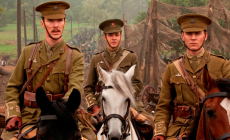
The award-winning 2011 film War Horse comes from a novel by Michael Morpurgo, a famous children’s author. It might surprise you to learn that it’s a children’s book, considering it is quite dark and covers some very tough territory, being set during the difficult time of the First World War. However, it’s no ordinary children’s tale – it’s powerful, iconic, moving and educational. The film adaptation was directed by Steven Spielberg, possibly the most successful director of our generation, and it was nominated for many Oscars and BAFTAs. With the centenary (100 year) celebrations of the First World War just beginning, there’s never been a better time to watch it.
The film follows the life of a young horse, a thoroughbred, a “remarkable” horse. It all begins in a quiet Devon village, where a young man called Albert forms an unbreakable bond with the horse, and gives him a name – “Joey”. Despite the doubts of the village, Joey saves Albert’s family from ruin when Albert teaches him how to plough. The war comes, and Joey is sold off to charming, young Captain Nicholls. Albert tearfully tells his horse goodbye, and Captain Nicholls says he will try to get Joey back to Albert at the end of the war. During his service in the war, Joey becomes best friends with another horse. Our journey takes us behind enemy lines, through the desolate battlefields and into the hearts of a peasant family. Wherever Joey goes, he’s faced with death and destruction, but also he is met with love from those who get to know him.
In this film, each and every character is constructed with care. Albert and his family, though troubled, have been through a lot and are clearly loving and strong. The bond between soldiers is shown to be as complicated as it really was, but the sense of having been through something horrible together ultimately strengthens their relationship. The film also suggests that no matter what social class you are, nobody is immune from the horrors of war and gunfire, although it does show that posher people gained higher ranks in the army than commoners like Albert (and probably our ancestors)!
If you like regional accents, then you’ll love this film – there’s everything from West Country to Geordie in here. One of the most underrated characters in the English scenes is a goose, whose comedy timing and combat skills are exactly on point. Watch out for that, as it’s one of the little touches of humour that give the film its human element.
On a more serious note, it raises a lot of questions about the war. There’s one powerful scene where a British soldier and a German soldier meet in no man’s land (that’s the bit between the trenches, where nobody went otherwise they’d get shot) to free Joey from some barbed wire. They work together to cut him loose, and their teamwork sparks up a conversation. From this, both the British soldier and the audience realise that the German soldiers were no more evil than ourselves. There is another scene where Captain Nicholls and his men on horses charge at the German soldiers asleep in their beds, but are faced with machine guns. The message is that at the end of the day, we are all human, fighting in a horrible war. During the terrifying battle scenes, you’ll ask yourself what the point of this war was. So, for many of us, it’s a platform for learning about the First World War, because it captures our interest. World War One is often overlooked and overshadowed by the Second World War, and so it is important to learn about it.
If you have a couple of hours to spare and want to learn why we mark the 100th anniversary of the First World War, give this film a try. If nothing else, it’s an excellent film, thoroughly deserving of the high praise it gained upon its release.
Image from: http://www.gq-magazine.co.uk/entertainment/articles/2011-12/16/war-horse-benedict-cumberbatch-exclusive

0 Comment:
Be the first one to comment on this article.